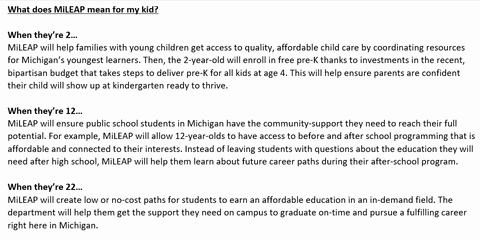Whitmer creates second Michigan education department
In a flying LEAP, governor expands mandate of state education system
Gov. Gretchen Whitmer created a second department of education in Michigan Wednesday. In addition to the Michigan Department of Education, Michigan will now have a Department of LEAP: Lifelong Education, Advancement, and Potential. Whitmer calls it MiLEAP.
The announcement of the new department comes as Michigan, under Whitmer’s leadership, moves away from merit pay for teachers and A-F grades for public schools.
Whitmer seeks instead to expand the mandate of the education system beyond its K-12 roots. Whitmer sees the real mission as lifelong learning.
“Every Michigander deserves a path to ‘make it in Michigan’ with strong, lifelong learning support,” Whitmer said in a statement accompanying the announcement.
“For too long, we have thought of education as K-12, but we know that’s not good enough,” Whitmer added. “I’m establishing MiLEAP today because we need to get every kid started early, in pre-K, so they succeed in kindergarten, have paths after graduation to get higher education tuition-free, and forge strong partnerships with our employers so they can get a good-paying, high-skill, and in-demand job.”
Whitmer said the new department will work as a partner with the old one, with the State Board of Education, and with the still-forming Growing Michigan Together Council, an advisory board that hopes to grow the state’s population.
Molly Macek, the Mackinac Center’s director of education policy, said the second education department is unlikely to produce results. Macek says K-12 education is the more appropriate focus.
“MiLEAP represents yet another expansion of government that is unlikely to produce results,” Macek told CapCon. “In partnership with the Department of Education, MiLEAP is supposed to help residents access preschool and postsecondary programs like Great Start Readiness and MI Reconnect. Yet, there is no evidence that MI Reconnect is leading to better jobs or earnings despite more high school graduates being eligible for free community college.”
“If growing Michigan’s economy and population is the governor’s goal, then keeping the focus on improving K-12 education should be her top priority,” Macek added.
The announcement contained three different scenarios, explaining what the new education department would mean for a two-year-old, a twelve-year-old, and a 22-year-old. That’s pictured below.
For the two-year-old, it means taxpayer-provided prekindergarten at age four. For the twelve-year-old, it means access to “before and after school programming that is affordable and connected to their interests.” At 22, it means “low or no-cost paths for students to earn an affordable education in an in-demand field.”
A year ago this week, CapCon Assistant Managing Editor Jamie Hope wrote that “Michigan schools that fail in their basic mission are taking interest in the ‘Whole Child,’” with a focus on P-20 education, far beyond the old K-12 agenda.
At the time it was not clear why. A year later, Michigan has a second department of education.
Michigan Capitol Confidential is the news source produced by the Mackinac Center for Public Policy. Michigan Capitol Confidential reports with a free-market news perspective.



 State Board of Ed seeks ‘constitutional clarity’ on second Michigan department of education
State Board of Ed seeks ‘constitutional clarity’ on second Michigan department of education
 Senator raises concerns over constitutionality of Whitmer’s new education department
Senator raises concerns over constitutionality of Whitmer’s new education department
 Michigan creates second education department, but the first has failed
Michigan creates second education department, but the first has failed

 DTE boss floats income-based energy bills
DTE boss floats income-based energy bills
 Michigan House takes solar, wind siting power from local communities, gives to governor
Michigan House takes solar, wind siting power from local communities, gives to governor
 National Popular Vote is national divorce, initiated by California
National Popular Vote is national divorce, initiated by California